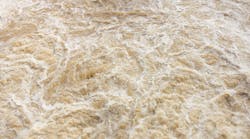Duckweed, a floating aquatic plant common in many U.S. waters, takes up toxic compounds more quickly than bacteria in the water can degrade these pollutants, then sequesters the compounds in its own plant tissue, according to scientists at the Georgia Institute of Technology.
Researchers found that duckweed (Lemna minor) takes up and sequesters—but does not degrade—various chlorinated, fluorinated, and mixed (chlorofluoro) compounds that "are representative of the pool of persistent [organic] compounds discharged into the nation's waters," according to a university press statement.
The sources of such compounds include agricultural pesticides and pharmaceutical residuals, the statement notes. "Though the compounds are sequestered in the plant, there is concern about their ultimate fate in the ecosystem as the plants are eaten by animals, or die and decay in wetland sediments," the statement notes. The findings may have significant "implications for both water monitoring regulations and wastewater treatment practices," the statement says. The researchers "believe duckweed and probably other aquatic plants are acting as 'sinks' for persistent organic compounds [and that] regulators monitoring contaminants in the water may be missing something by not considering the plant uptake of these compounds - a process that is affecting the overall removal time of the contaminants from the water," the statement says.
Source: GIT

